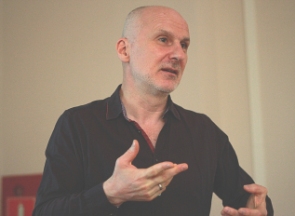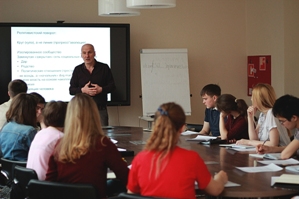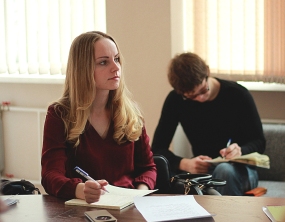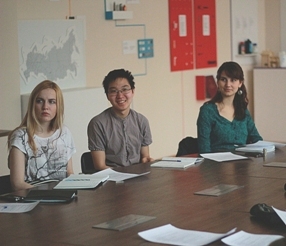A course by Nikolai V. Ssorin-Chaikov through the students’ eyes
“As usual, lectures were interesting and anthropological…”

There were eight classes held, which are a part of professor Ssorin-Chaikov’s course he has been delivering for TSU students of anthropology since 2013. Each class was attended by over 20 young anthropologists. There were also public lectures held by the professor in the city of Tomsk – on the topics of ‘Ethnographic conceptualism: social science art’ and ‘Merchants and indigenous peoples: a hundred years on’ – that everyone could attend.
Through his lectures, Nikolai, using various examples, acquainted students with the fundamentals of ethnographic research methodology and anthropological approaches to social and cultural analysis of the modern world. Empirical data were accompanied by overview of major theoretical schools of anthropology in the context of changing perspectives on the mission and functions of anthropological knowledge starting from its origins in the 19th century and up to contemporary anthropologists and social sciences philosophers’ views.

Dmitriy, 1st year student:
The lecture course ‘Introduction to Social Anthropology’ made a revolution of a kind in my head. Nikolai Vladimirovich, through some interesting examples, showed us what anthropology is and defined, in my view, the right direction we should proceed in. As it was my first experience of attending lectures of this kind, I took a lot from them: from a more detailed acquaintance with Bronislaw Malinowski’s works to getting to know contemporary authors’ writings. This is the very foundation to start learning more about social anthropology. Undoubtedly, I now understand this field much better. I came to a conclusion that it has to do more with philosophy rather than history. I was particularly drawn by the fact that Nikolai Vladimirovich has worked at both Russian and foreign universities which is obviously a great advantage. It would be great to have more specialists of the kind who could share their experience with us.
Seminars by Nikolai Vladimirovich Ssorin-Chaikov were quite productive! A look at the first lecture when we, together with the master students, discussed anthropological approaches of Bronislaw Malinowski and our contemporary Tom Boellstorff would be enough to prove that. Based on two books of theirs, we looked into their research methods, as well as advantages and disadvantages of these. In our discussions some quite unexpected questions came up which we tried to answer all together.
I believe you know what it is like when you are in a lecture or a seminar and you realize that you are getting bored, so you lose interest. But in this case it was not like this at all. Each time we met, we studied something, drew comparisons and searched for answers. And intense interest was always there: we were all like ‘what other questions can we ask about the topic?’, ‘what else could we study in this field?’, etc. I think the very atmosphere in class was conducive to changing one’s thinking and trying looking at problems from another angle. Indeed, we can say that after each class we took new useful knowledge with us.
1st year master students:
The seminars by Nikolai Ssorin-Chaikov for master students of anthropology dealt with different topics. Discussions were developed in an unusual way: no questions were given prior to classes, instead, they were posed in class and that stimulated us to build up our arguments from all possible perspectives and made us think critically about what we had read as well as consider possible ways of developing concepts and approaches in question further. In the seminars, we could analyze how ethnographic knowledge is produced and represented, compare the notion of the ‘field’ as it was in the early 20th century when used by Bronislaw Malinowski in his research in the Trobriand Islands to how it is seen today when it can even be found in cyber-space – virtual reality can be a modern research object (for example, a network game online), a ‘second life’ of a kind which is no less ‘real’ for those who live it than, indeed, life offline (Tom Boellstorff’s research provides some interesting insights into that).

These and many other questions we had a chance to discuss with Nikolai Ssorin-Chaikov during the seminars allowed, among other things, to greatly appreciate the heuristic potential of anthropology, its specificities as a special research lens and opportunities it provides.
Photos by Olga Makienko






 The project "Man in a Changing World. Identity and Social Adaptation: Past and Present" is funded by the Russian Government
The project "Man in a Changing World. Identity and Social Adaptation: Past and Present" is funded by the Russian Government 